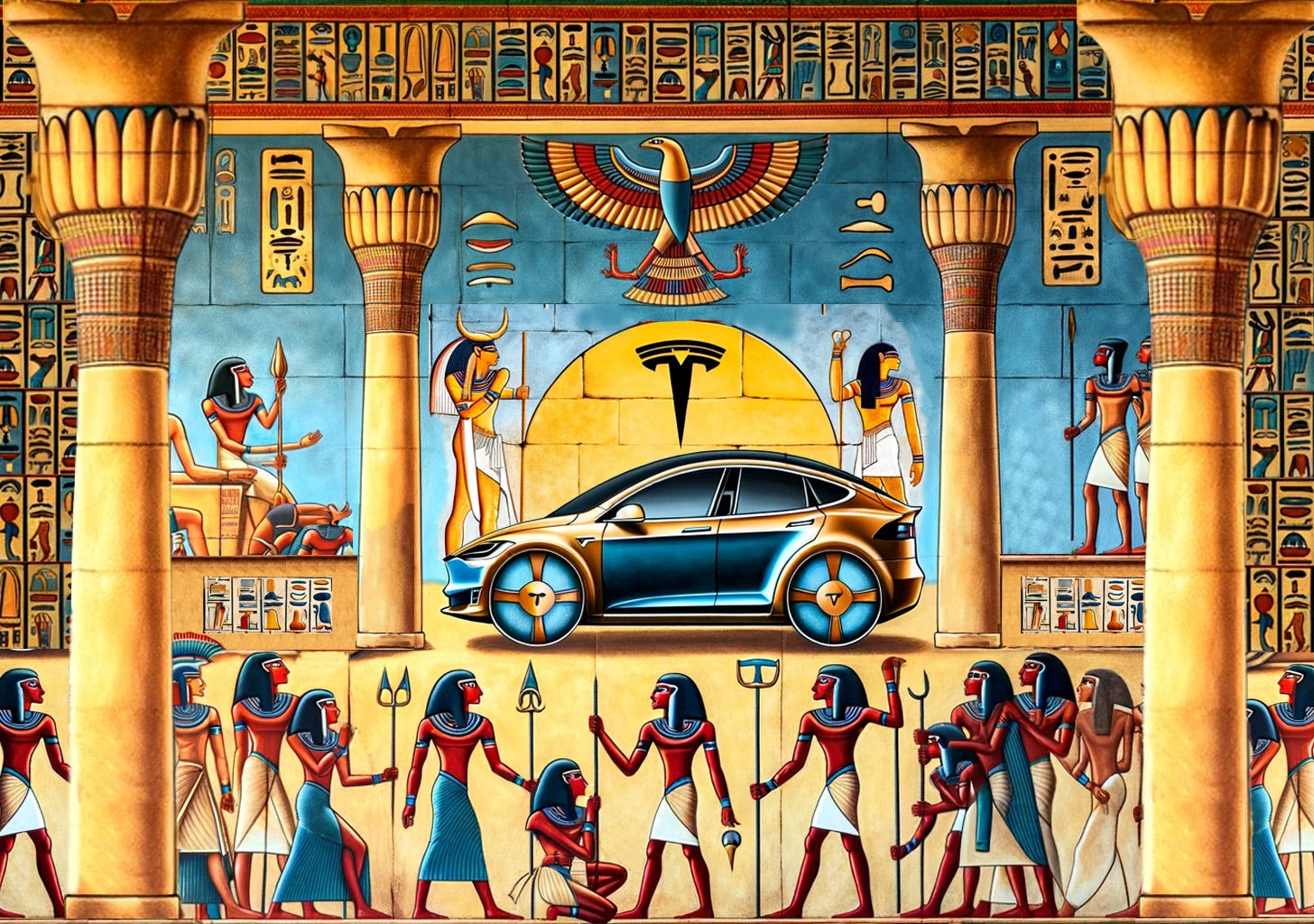What Elon Musk could learn from Ramesses III
If Ramesses III, divine god-king of ancient Egypt, had to give in to his workers demands, Elon Musk's chances of besting his are slim. Ultimately, key competence in critical roles will always win.
You know I like to bang on about all you can learn from history. Well, Elon Musk does not appear to have gotten the memo. Tesla has been at war with the Swedish unions for the last few months. The company refuses to sign a collective agreement, and thus, the workers are on strike. Collective agreements are the norm in Sweden. Strikes, on the other hand, are pretty rare. The Tesla strike is Sweden's longest-running strike in 80 years.
That's a long time, but it's nothing compared to 3180 years. That’s how many years ago the first recorded strike in history happened. It took place in the Egyptian village of Deir el-Medina during the reign of Ramesses III. Musk should read up on it.
There’s a lot to be impressed by in ancient Egypt, but the pharaoh ran the show during those 3500 years of Egyptian history. He handed out orders and distributed the workload without any meaningful dialogue with the workers. Sure, there were perks like lunch (beer!) and rudimentary healthcare for the pyramid builders, but being a worker in ancient Egypt was no walk in the park. Or as Tim Rice cleverly sums it up in his and Andrew Lloyd Webber's underrated musical, Joseph and the Amazing Technicolor Dreamcoat:
"If he [pharaoh] cracked a joke / Then you chortled for days / No-one had rights or a vote but the king / In fact you might say / He was fairly right-wing / When Pharaoh's around, / Then you get down on the ground / If you ever find yourself near Ramesses / Get down on your knees." (från "Pharaoh's Story".)
But when the workers in Deir el-Medina didn't get their pay for several months in a row, they had enough and went on strike. It even reached the point where they blockaded the Valley of the Kings. Both sides of the conflict leaned on Maat - the Egyptian concept of world harmony and balance. Everyone had their place and role in society, and not fulfilling it was considered a violation of Maat, leading to chaos and misery. From the authorities' point of view, the workers broke Maat by not working. From the workers' point of view, the Pharaoh broke Maat by not caring for them properly.
Given the massive power imbalance, you would think the strike would end badly for the workers, but no. It had a happy ending. Ramesses III was most likely the wealthiest man in the world. He effectively owned Egypt. He was also considered divine, a god-king. But Deir el-Medina wasn't just any village. It was the home of the workers and artists who carefully carved out and decorated the royal tombs in the Valley of the Kings. In a civilization obsessed with eternal life, these guys were essential. They were the best of the best. They couldn't be replaced either quickly or easily. Finally, the authorities caved. Nobody dared to risk the Pharaoh dying without a ready-to-go tomb from which to launch him into eternity.
Having key competence in critical roles is just as important today as it was 3000 years ago. And thankfully, we expect better and healthier leadership now. If Elon Musk and other union-averse leaders think they are better positioned to ignore their employees' needs than Ramesses III was, they're sorely mistaken. Musk may be the wealthiest man on the planet, but as long as he isn't personally building, shipping, and servicing all Tesla cars, he ultimately depends on experts to do the work for him. If you want to build the future, you can't just stare obsessively ahead. Sometimes, you need to have a good look in the rearview mirror, too. There's valuable information there.
Unfortunately, there's a bit of a downside to the uplifting story of the first recorded strike in history. The Deir el-Medina workers managed to get their divine boss to bend to their will, but they couldn't escape another work-related pain we all know all too well: commuting. When the workers’ bones were examined, it was discovered that their knees and ankles were in bad shape. Trekking the steep path between their homes in the village and work in the Valley of the Kings had taken a painful toll over the years.
Yet, there's a silver lining. When future archaeologists dig up my bones in 3000 years or so, they'll find an impressive iHunch and severe thumb injuries from all the hours I spent on an icy cold train platform in the middle of nowhere, desperately Googling how to get home. Or, at least, avoid sleeping under the stars after my train has vanished into thin air. How's that a silver lining? Given the mental and physical toll failing transportation has taken on me, I've long given up hope of justice in this life. But maybe future generations will see the physical signs of my suffering and spare me a kind thought. That's something, right?
* If you're interested in Joseph and the Amazing Technicolor Dreamcoat, the 1974 studio recording is the way to go for three reasons: 1. No Donnie Osmond. Good! 2. No Jason Donovan. Doubleplusgood! 3. No children's choir. Trippleplusgood!



